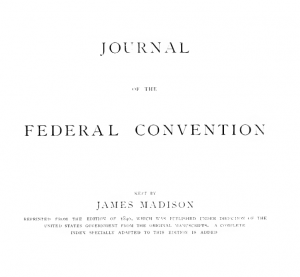 June 11, 1787
June 11, 1787
Summary: Today, the delegates voted on the 3/5 clause. They passed it with minimal discussion but revisited it on July 12 when discussion of taxation took place.
Again Britain was a model for Roger Sherman from CT.
Mr. SHERMAN proposed, that the proportion of suffrage in the first branch should be according to the respective numbers of free inhabitants; and that in the second branch, or Senate, each State should have one vote and no more. He said, as the States would remain possessed of certain individual rights, each State ought to be able to protect itself; otherwise, a few large States will rule the rest. The House of Lords in England, he observed, had certain particular rights under the Constitution, and hence they have an equal vote with the House of Commons, that they may be able to defend their rights.
Franklin also illustrated his thoughts with the example of Britain:
I recollect that, in the beginning of this century, when the union was proposed of the two kingdoms, England and Scotland, the Scotch patriots were full of fears, that unless they had an equal number of representatives in Parliament, they should be ruined by the superiority of the English. They finally agreed, however, that the different proportions of importance in the union of the two nations should be attended to, whereby they were to have only forty members in the House of Commons, and only sixteen in the House of Lords. A very great inferiority of numbers! And yet to this day I do not recollect that any thing has been done in the Parliament of Great Britain to the prejudice of Scotland; and whoever looks over the lists of public officers, civil and military, of that nation, will find, I believe, that the North Britons enjoy at least their full proportion of emolument.
Franklin later returned to this model:
“This mode is not new. It was formerly practised with success by the British government with respect to Ireland and the Colonies. We sometimes gave even more than they expected, or thought just to accept; and in the last war carried on while we were united, they gave us back in five years a million sterling. We should probably have continued such voluntary contributions, whenever the occasions appeared to require them for the common good of the Empire. It was not till they chose to force us, and to deprive us of the merit and pleasure of voluntary contributions, that we refused and resisted. These contributions, however, were to be disposed of at the pleasure of a government in which we had no representative. I am, therefore, persuaded, that they will not be refused to one in which the representation shall be equal.
The 3/5ths clause was then considered with very little commentary:
It was then moved by Mr. RUTLEDGE, seconded by Mr. BUTLER, to add to the words, “equitable ratio of representation,” at the end of the motion just agreed to, the words “according to the quotas of contribution.” On motion of Mr. WILSON, seconded by Mr. PINCKNEY, this was postponed; in order to add, after the words, “equitable ratio of representation,” the words following: “in proportion to the whole number of white and other free citizens and inhabitants of every age, sex and condition, including those bound to servitude for a term of years, and three-fifths of all other persons not comprehended in the foregoing description, except Indians not paying taxes, in each State” — this being the rule in the act of Congress, agreed to by eleven States, for apportioning quotas of revenue on the States, and requiring a census only every five, seven, or ten years.
Mr. GERRY thought property not the rule of representation. Why, then, should the blacks, who were property in the South, be in the rule of representation more than the cattle and horses of the North?
On the question, — Massachusetts, Connecticut, New York, Pennsylvania, Maryland, Virginia, North Carolina, South Carolina, Georgia, aye — 9; New Jersey, Delaware, no — 2.
